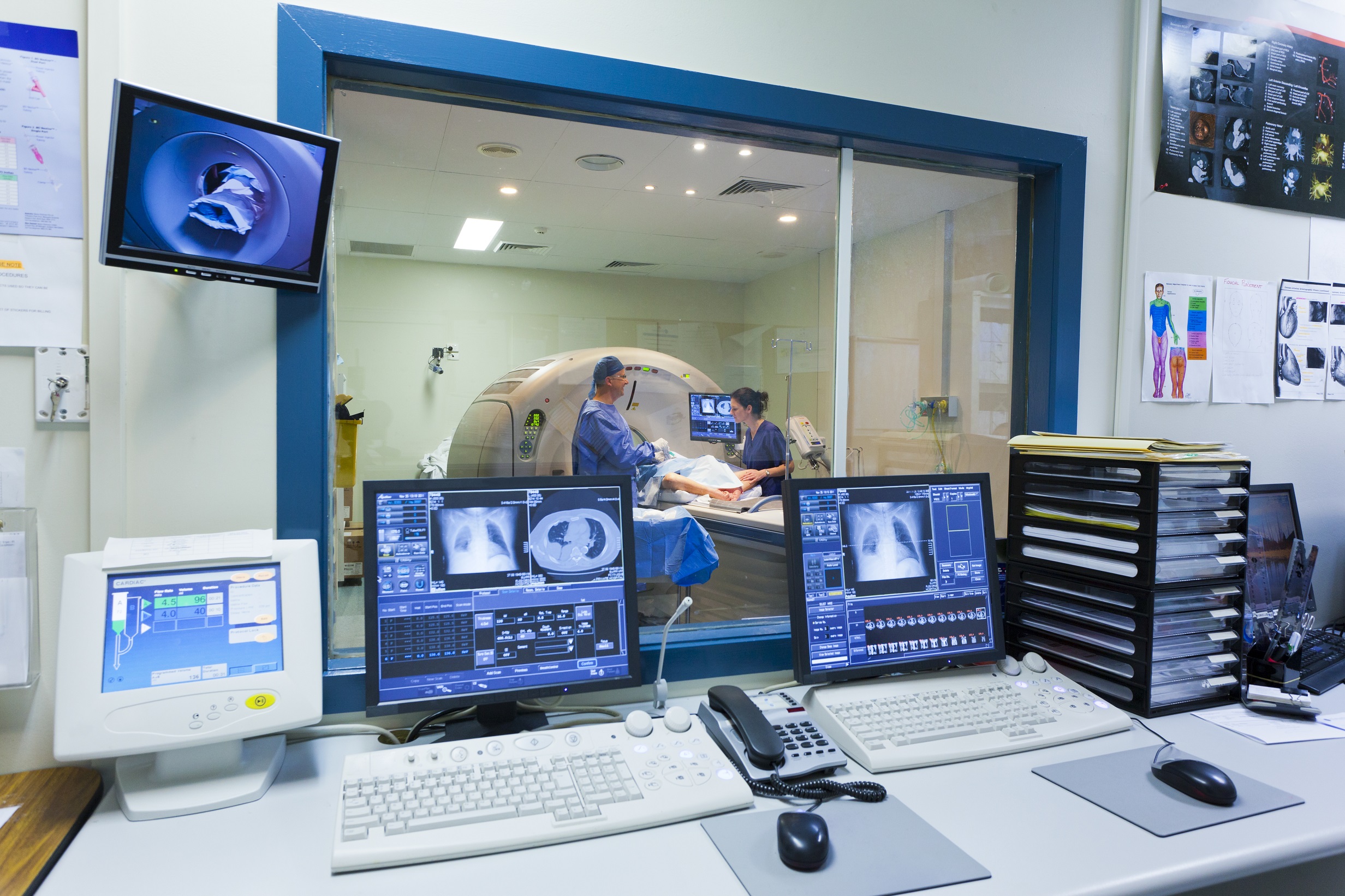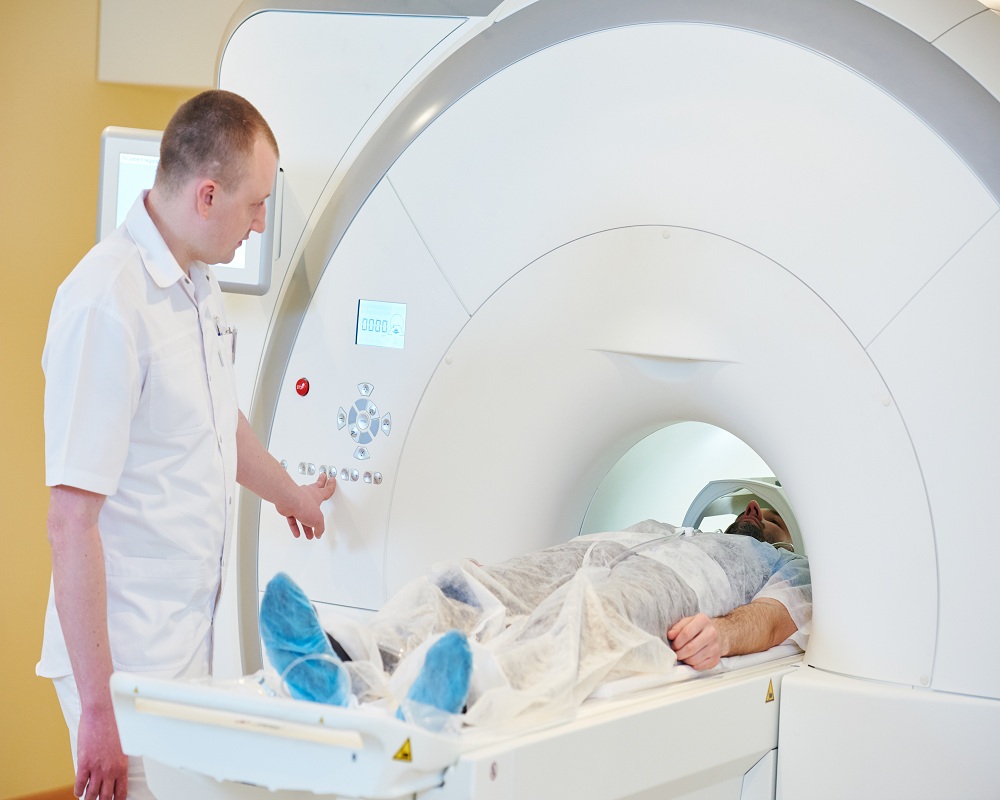Magnetic Resonance Imaging, or MRI, is a non-invasive test that uses radio waves and magnetism to produce detailed images of your body’s structures and organs. Once the doctors get the required cross-sectional image, they’ll be in a position to examine your blood vessels and heart more closely.
Magnetic Resonance Imaging, or MRI, is a non-invasive test that uses radio waves and magnetism to produce detailed images of your body’s structures and organs.
How Does An MRI Scanner Work?
The standard MRI scanner resembles a huge donut due to its thin, tunnel-like opening and features a huge magnet. This machine produces powerful radio and magnetic waves that receive signals from your body’s nuclei of hydrogen atoms. These signals are then converted into black and white images.
To help get clearer images, contrast materials are added to your body through the veins. After they’ve been absorbed, the rate at which the tissues respond to the radio and magnetic waves is much faster. The picture clarity improves with stronger signals, and the main goals of these scans are to;
- Diagnose cancer and determine the extent of its spread
- Know suitable ways of treating cancer
- Examine other parts of your body to determine whether you’ve got specific illnesses
It’s for this reason that MRI scans are carried out to help in prostate cancer detection. Using MRI images, doctors can determine the most suitable treatment option, between either radiation therapy or surgery.
How Do You Prepare For An MRI Scan?
In most cases, MRI scans are carried out on an outpatient basis, so you don’t need to be admitted to the hospital beforehand. This is because there isn’t much preparation necessary for an MRI scan. You also aren’t required to observe any particular diet, but you’ll still need to make some preparations. This include informing your doctor on several important details such as;
- Ifyou’ve recently had surgery.
- If you suffer from health complications.
- If you’re pregnant.
- If you have any medicine or food allergies.
The doctor will then request that you take out allmetal accessories or jewelry, as this affects the magnets used by the machine. If there are any metallic medicalparaphernalia inside your body, such as aneurysm clips, cochlear implants or pacemakers, you cannot use an MRI scanner.
During the preparation, the doctor will inject you with an intravenous (IV) contrast liquid, which helps to boost the visibility of certain tissues. Subsequently, you’ll be guided through the steps of the MRI scan; feel free to ask any pertinent questions you have regarding the procedure. At this point, you should inform your doctor if you’re claustrophobic. This will allow them to make sure that enough room is created inside thescanner to make you feel more comfortable. The doctor may also opt to administer certain medication, to ease your anxiety while the MRI scan is being performed.

What Happens During The MRI Test?
Once your doctor has fully prepared you for thescan, they’ll ask you to lie on a movable exam table. You’ll be given a headrest and straps to ensure that you remain in the correct position and feel comfortable. A small medical gadget might be placed around or over a specific body part; this is just to aid the radio waves in generating a clearer picture.
After everything is in place, the technologist exits the room and goes to a nearby control station where they see you through a video or glass window. Thescanner features an intercom toallow you both to communicate.
With everything in place, the exam table will start to move into the scanner through the hole. The machine will then take a series of photos, with each taking around 15 minutes. Usually, two to six pictures are needed, meaning that the test can last anywhere from30to90 minutes. In some instances, it lasts for as long as two hours; this is if the pictures taken previously weren’t very clear, thereby necessitating another set.
During the test, you may also hear some loud knocking sounds, which is normal and shouldn’t concern you. If you find these sounds annoying, you’re given earphones or earplugs to cancel them out. And while the MRI test is uncomfortabledue to remaining in the same position for a relatively long time, you won’t feel any pain.
What Happens After The MRI Scan?
Once the MRI scan is complete, you can go home and continue with your normal routine. But if you were injected with medicine to help you calm down during the test, you’ll need to remain at the imaging center until completely awake. In addition, you should have someone to drive you back home.
The MRI images will then be examined by a radiologist, who’ll send a copy of their report to your doctor. You should make an appointment with your doctor to discuss the test results.
Are There Any Risks Associated With MRI Scans?
If you have cancer, it’s essential to always look after your wellbeing by knowing the possible effects of any medical tests before undertaking them. The same should be the case when you’re about to take an MRI test. There are some risks associated with the MRI scan, including;
- Feeling lightheaded or dizzy due to low blood pressure.
- Slight pain where the needle was injected.
- A taste of metal.
- Gadolinium, a contrast material used during the MRI, could result in health issues if you’re suffering from serious kidney issues.
Takeaway
MRI scans do help to detect some forms of cancer. Therefore, taking an MRI scan is recommended to detect any cancerous cells in your body, and to gauge the extent to whichthey’ve spread. If you were skeptical about whether this test is actually helpful in testing for cancer, you can go back over this article and reassure yourself with the facts.
Keeping this information in mind, you can now comfortably have these tests carried out, knowing that they’ll help you to locate any cancerous cells if they exist. As a result, your doctor willdevelop a suitable treatment plan for you to get better.


